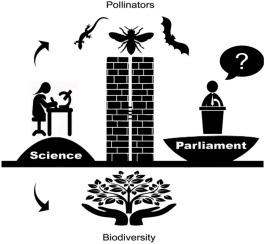Perspectives in Ecology and Conservation ( IF 4.0 ) Pub Date : 2021-02-13 , DOI: 10.1016/j.pecon.2021.01.003 Juliana Hipólito , Jeferson Coutinho , Thiago Mahlmann , Thymon Brian Rocha Santana , William E. Magnusson

|
Global biodiversity declines and concomitant increases in diseases and calamities indicate the need for well-founded measures to provide sustainable development, guaranteeing material progress and social welfare, while safeguarding biodiversity. Public policies are important in this context as they provide norms for actions to deal with economic and socio-ecological problems. Nevertheless, scientists and legislators have conflicting opinions; perhaps due to lack of knowledge on both sides. Scientists provide information that is never used by legislators and legislators provide laws that do not provide biodiversity protection. Review and understanding of local legislation are thus crucial to understand those relationships and to provide robust suggestions for change. Here, we review Brazilian legislation concerning pollinator-relevant policies to show how these subnational policies fit calls from the science community. We also compared Brazilian legislation related to pollinator and biome protection to legislation in other countries. We found 314 national, state, and municipal laws on apiculture, meliponiculture, economic incentives, pesticides, pollinator awareness, and city planning. Although scientists are producing high-quality science to provide information for legislative standards, that information is not being used. Brazilian policies are numerous, but, in general, lack the standards to provide sustainable conservation. The main flaws are related to the lack of knowledge about non-bee pollinators, integrated pest management and GM crop risks, and lack of long-term monitoring of pollinators and pollination. More comprehensive and interdisciplinary legislation is needed to accomplish crop and biodiversity protection. Brazilian scientists should be consulted more often and participate in proposals for laws relating to pollinator conservation.
中文翻译:

立法和授粉:政策制定者和科学家的建议
全球生物多样性的下降以及疾病和灾害的随之增加表明,需要采取有充分根据的措施,以提供可持续发展,保证物质进步和社会福利,同时保护生物多样性。在这方面,公共政策很重要,因为它们为处理经济和社会生态问题的行动提供了规范。然而,科学家和立法者意见相抵触。也许是由于双方缺乏知识。科学家提供了立法者从未使用过的信息,而立法者提供了不提供生物多样性保护的法律。因此,对当地法规的审查和理解对于理解这些关系并提供有力的变革建议至关重要。这里,我们回顾了巴西有关传粉媒介相关政策的立法,以说明这些地方政府政策如何适应科学界的呼吁。我们还将巴西与传粉媒介和生物群落保护相关的法规与其他国家的法规进行了比较。我们发现了314个国家,州和市政府关于养蜂业,黑皮牧业,经济激励措施,杀虫剂,传粉媒介认识和城市规划的法律。尽管科学家们正在生产高质量的科学来为立法标准提供信息,但这种信息并未得到使用。巴西的政策众多,但总的来说,缺乏提供可持续保护的标准。主要缺陷与缺乏对非蜜蜂授粉媒介的知识,病虫害综合治理和转基因作物风险以及对授粉媒介和授粉缺乏长期监测有关。需要更全面和跨学科的立法来实现对作物和生物多样性的保护。应与巴西科学家进行更频繁的磋商,并参与有关授粉媒介保护法律的提案。











































 京公网安备 11010802027423号
京公网安备 11010802027423号